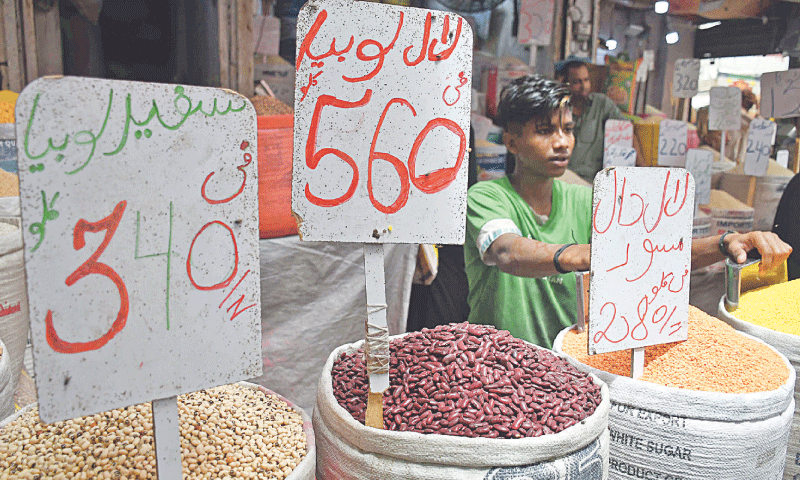Pakistan’s consumer price index (CPI) inflation rate maintained a sharp deceleration trend on Thursday, hitting a six-decade low of 0.7 per cent year-on-year (YoY) in March.
The current situation in Pakistan reflects disinflation, which signifies a slowdown in inflation. In contrast, deflation occurs when the general price levels decline.
According to the Pakistan Bureau of Statistics, CPI inflation decreased to 0.7pc on a year-on-year basis in March 2025 as compared to 1.5pc in Feb and 20.7pc in March 2024.
“On a month-on-month basis, it increased by 0.9pc in March 2025 as compared to a decrease of 0.8pc in the previous month,” it said.
Topline Securities, a brokerage firm in Karachi, said, “Pakistan’s CPI for March 2025 has clocked in at 0.7pc, the lowest monthly YoY reading in over three decades.
“Inflation in February 2025 was 1.5pc,” it stated. “Inflation during 9MFY25 has averaged at 5.25pc compared to 27.06pc in 9MFY24.”

Year-on-year
Urban:
Food item prices that increased included: pulse moong (31.02pc), butter (23.84pc), besan (21.66pc), honey (21.02pc), milk powder (20.63pc), pulse gram (19.42pc), sugar (18.75pc), fresh fruits (18.31pc), chicken (17.20pc), meat (15.87pc), and vegetable ghee (15.69pc).
Non-food items prices that increased: motor vehicle tax (168.79pc), footwear (31.89pc), dental services (27.20pc), medical tests (15.53pc) and drugs & medicines (15.26pc).
Rural:
Food item prices that increased: fresh fruits (24.62pc), tomatoes (22.11pc), chicken (15.40pc), eggs (14.32pc), sugar (11.31pc), and fresh vegetables (6.34pc).
Non-food items that increased: tailoring (5.13pc), education (3.16pc), readymade garments (2.97pc), liquified hydrocarbons (2.53pc), and cotton cloth (1.56pc).
Month-on-month
Urban:
Food items that increased: tomatoes (36.35pc), fresh fruits (18.66pc), eggs (14.92pc), sugar (11.48pc), chicken (10.87pc) and fresh vegetables (6.13pc).
Non-food items prices that increased: readymade garments (2.15pc), tailoring (1.84pc), liquified hydrocarbons (1.83pc), and cotton cloth (1.74pc).
Rural:
Food items that increased: fresh fruits (24.62pc), tomatoes (22.11pc), chicken (15.40pc), eggs (14.32pc), sugar (11.31pc), and fresh vegetables (6.34pc).
Non-food items that increased: tailoring (5.13pc), education (3.16pc), readymade garments (2.97pc), liquified hydrocarbons (2.53pc), and cotton cloth (1.56pc).
PM Shehbaz expresses confidence in economy
Prime Minister Shehbaz Sharif expressed his confidence in the improving economy, citing improved inflation numbers, state-owned Radio Pakistan reported.
Speaking at an event today, the premier said said that bringing the inflation down to single-digits was the election manifesto of the PML-N.
Additionally, he noted that petrol prices had decreased and the monetary policy rate has been reduced to 12pc from the high of 22pc.


































